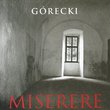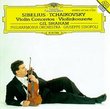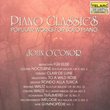| All Artists: John Adams, Colorado Symphony Orchestra, Marin Alsop, Opera Colorado Chorus, Douglas Kinney Frost, Robert Orth, Maria Kanyova, Thomas Hammons, Marc Heller, Tracy Dahl, Chen-Ye Yuan, Melissa Malde, Julie Simson, Jennifer DeDominici Title: Adams: Nixon in China Members Wishing: 1 Total Copies: 0 Label: Naxos American Original Release Date: 1/1/2009 Re-Release Date: 10/27/2009 Album Type: Box set Genre: Classical Style: Opera & Classical Vocal Number of Discs: 3 SwapaCD Credits: 3 UPC: 730099902274 |
Search - John Adams, Colorado Symphony Orchestra, Marin Alsop :: Adams: Nixon in China
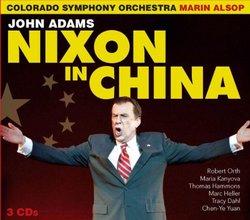 | John Adams, Colorado Symphony Orchestra, Marin Alsop Adams: Nixon in China Genre: Classical A longtime collaborator of John Adams and champion of his music, Marin Alsop directs this live recording of Opera Colorado's 25th Anniversary Celebration production of Nixon in China, presented at Denver's new Ellie Caulki... more » |
Larger Image |
CD DetailsSynopsis
Product Description A longtime collaborator of John Adams and champion of his music, Marin Alsop directs this live recording of Opera Colorado's 25th Anniversary Celebration production of Nixon in China, presented at Denver's new Ellie Caulkins Opera House during the 2008 National Performing Arts Convention, and featuring an internationally recognized cast. Alice Goodman's epic libretto and John Adams's distinctive music weave together a colourful fabric of actual events from President Nixon's historic visit to the People's Republic of China with intimate examinations of the opera's real life characters. The spectacle, drama, humor and pathos of this masterpiece remain as compelling today as when the opera was premièred in 1987. Similarly Requested CDs
|
CD ReviewsLong overdue kelsie | Plainview, Texas United States | 10/29/2009 (5 out of 5 stars) "John Adams's Nixon in China is one of the most important American contributions to opera from the 20th-century, and a new recording to succeed Edo de Waart's magnificent cut with the Orchestra of St Luke's is FAR overdue. The opera itself is a wedding of Adams's unique form of minimalism with Alice Goodman's incomparably beautiful libretto. Unlike Glass's almost purist form of minimalism or Reich's deep interest in textures and harmonic relationships, Adams's writing is, by and large, melodic and even somewhat conventional at times. The Colorado Symphony are in top form, playing assertively and with audible gusto. The libretto is in itself a masterpiece--Anglican minster Alice Goodman's work is simply breathtaking in its expression and beauty. And Alsop allows the words to breathe and soar--in many spots (such as the hilariously complicated banality of the "Cheers!" chorus at the end of Act One), the libretto is clearer on this recording than in de Waart's larger cut. Marin Alsop's recording strikes a very different ambience and tone from de Waart's. Immediately, the listener can hear a much broader, perhaps more epically "operatic" tone from the cast. Robert Orth's Nixon is less nimble than James Maddalena's, sharper and somewhat more nasal. His earthy interpretation is full of spontaneity and gives Nixon a more diverse portrait than Maddalena's very clean singing. Perfectionists will be slightly put off by his bent tuning and tendency to speak, rather than sing, at exclamatory points in the libretto, but the result is dazzling and has the stamp of authenticity all over it. A good sampler is the famous accompanied aria, "News Has a Kind of Mystery"--from this, a listener can gauge whether or not Orth's more spontaneous Nixon is worthwhile or not. Marc Heller's Chairman Mao has a tendency to sound stuffy and old--this might be more "historically accurate" to the narrative, but it is a little off-putting at times, especially in some of Adams's beautiful writing for Mao--the passage, "The world to come has come..." from "Founders come first", for example. Here, John Duykers in de Waart's cut offers a powerful and moving, but also carefully subtle, treatment of this brief passage. Heller's heavy operatic tone is somehow less satisfying. The high octane aria from Tracy Dahl (Madame Mao), "I am the Wife of Mao Tse-tung" is given a full-throated, effortlessly thunderous reading demonstrating Dahl's magnificently powerful soprano. The contemplative side of the opera is not left out: Chou En-Lai's beautiful aria before the end of the first act is given a wonderfully nuanced performance. Naxos deserve a great deal of praise for this production: the sound quality is spot-on, the cast and orchestra give convincing, top-notch performances, and all at a nice price. As I have bought a digital copy of the set, I don't know whether it comes with a copy of the libretto or not--most likely it does." Look down and think what we have undergone Jay Dickson | Portland, OR | 01/06/2010 (5 out of 5 stars) "It's been more than twenty years since the first recording of John Adams's NIXON IN CHINA came out with the original cast, and in the intervening years the opera has been established as probably the single most performed American opera in history. (It awaits its first production at the Metropolitan Opera, which should sanction its position in the operatic canon, next season.) It has thus been long overdue for a new recording, and this new Naxos set led by Marin Allsop could not be more welcome. This set takes the cast of the recent imaginative James Robinson production that played in multiple cities (including Denver, Chicago, Saint Paul, and Portland, OR) from its first iteration with Opera Colorado; the recording is from multiple live performances, although the audience reactions are fairly well edited out until curtain calls for each act (though you do hear the sounds of the dancing of the Red Guard in the famous second-act ballet sequence "The Red Detachment of Women"). First of all, the music. Allsop's conducting here is remarkable, and reveals subtleties that had long been hidden from anyone who only had the Elektra set with its uninspired conducting by Edo de Waart. John Adams's music caused such a sensation by itself that few protested too much at the time of the De Waart recording the glue-like quality of the orchestra, but Allsop's remarkable work brings out things in the opera I had never noticed closely before. In the first act, for instance, in the transitional music between the first scene at the Peking Capitol Airport and the second scene where President Nixon meets privately with Mao Tse-tung in the Chairman's study in the Imperial City, Allsop marks the movement into the chugging music that is always associated with Mao with startling drama, as if to emphasize the terrifying power of the Chairman's inestimable intellect. Then, as Nixon and Kissinger are ushered into the study, Allsop changes this music's tempo markedly twice, suggesting how Mao is going to have to purposefully slow his thinking down to converse at all with these Westerners who are not up to his philosophical standards. (Indeed, the meeting is not a real success because the President and the Chairman never speak from the same set of references.) And in Act II, Mrs. Nixon's funny visit to the Evergreen People's Commune's swine farm ("Come, come see the pigs") is marked by an exciting passage on the basses you could not hear at all on the De Waart recording. The cast is, for the most part, quite fine. Robert Orth does not have as heroic a baritone as James Maddalena, the original Nixon, but Orth is an equally fine actor, and his plangent tones convey Nixon's neuroses admirably. Conversely, Chen-Ye Yuan as Chou En-Lai has a much more heroic baritone than his predecessor Sanford Sylvan, who slipped into Chou's sonorous lines with great ease, as if to emphasize the Premier's consummate elegance; even so, Yuan is in glorious voice, and sings the beautiful toast near the end of the first act with majesty. The most exciting member of the main cast is Tracy Dahl, who has won national awards for her Madame Mao; it is amazing to hear the expressiveness of her coloratura, and though she sings the showstopping aria "I am the wife of Mao Tse-tung" at the end of Act II with all its drama and electricity, she brings out something much subtler that I had heard in the role before in Act III. (I had never been aware of the fine nuances in Madame Mao's arioso "I can keep still" in the final act until I had heard Dahl in this recording.) Marc Heller, who has sung many of the romantic tenor roles in the French repertoire, sounds perhaps more like Don Jose than Mao Tse-tung, though his singing is mostly fine. (The opera has still to be recorded with a true heldentenor singing the part as Adams envisioned; it is unfortunate that Simon O'Neill, who has sung Lohengrin at the Met and memorably portrayed Mao in the recent Minnesota Opera performances of the Robinson production, could not have sung the role here.) As Pat Nixon, Maria Kanyova chooses to emphasize the First Lady's innocence rather than her intelligence and despair as Carolann Page so memorably did in the work's original productions. Although it is lovely to hear "This is prophetic!" sung so gracefully here (Kanyova hits the high notes on the phrase "Let them pass" with perfect ease), and she has beautiful diction, you miss having as strong an actress as Page conveying how Mrs. Nixon slowly learns how to listen to the Chinese people (something her husband never learns to do) in the crucial sightseeing scene. Yet even with a few disappointments in the cast, however, this recording is absolutely worth buying. The conducting is nonpareil, and lets you hear NIXON IN CHINA as if for the first time." About the same overall as the original, but with a sharper N Santa Fe Listener | Santa Fe, NM USA | 02/19/2010 (5 out of 5 stars) "I think the lead reviewer has gotten everything right when comparing this new Naxos version of Nixon in China with the original Nonesuch recording. He is particularly accurate in describing Robert Orth's Nixon as sharper and more spontaneous. Because of its mechanical repetition, minimalism doesn't give the kind of room for developing characters psychologically as conventional opera. Within that constraint, however, Orth does what he can to round out Nixon's complex, insecure, deceptive, banal, mesmerizing persona as we observed it in real life.
The other obvious improvement is the sound. The leading voices are closer; Naxos doesn't have the glaring edge and metallic quality of the Nonesuch, and orchestral detail is noticeably clearer. For these two reasons, I feel compelled to award five stars. Artistically, however, the overall result is about the same between the two recordings. Both choruses are only medium good, with lots of strained soprano singing and no great ability to project the text. Alsop, although extravagantly praised by other reviewers, is also medium good, a bit more yielding and flexible than de Waart, sometimes more alert, sometimes less. The problem is that minimalism isn't a conductor's medium. Again, there is so much mechanical repetition that finding room for interpretation isn't easy. As a rule, Philip Glass's operas on disc are not conducted beyond a certain level of proficiency -- only once in live performance have I heard a conductor go the extra mile (Johannes Debus leading Glass's masterpiece, Satyagraha, at the English National Opera; I didn't hear Donald Runnicles at the Met when the same production crossed the Atlantic, but I wish I had). Any composer would die to have competing versions of a modern opera in print, and in an ideal world, this newcomer would stand out musically compared to the premiere recording. That's not the case, but it's welcome to find a gripping Nixon, with his wife Pat being sung quite sympathetically by Maria Kanyova." |

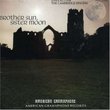

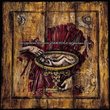


![Across The Universe [Deluxe Edition]](https://nationalbookswap.com/cd//m/51/1251/1241251.jpg)
